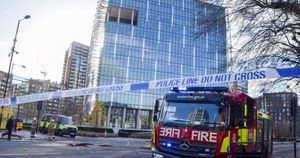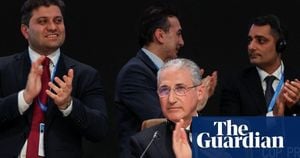Hezbollah Media Chief Mohammad Afif was killed on Sunday during an Israeli airstrike on central Beirut, marking another escalation of tensions between Israel and Hezbollah. This attack, which also claimed the lives of three other individuals, targeted the site of the Arab Socialist Ba'ath Party’s office, reflecting Israel's aggressive military strategy aimed at key figures within Hezbollah amid the continuing conflict.
The strike occurred around noon and involved the release of two precision missiles, according to the Lebanese TV network al-Jadeed. Eyewitnesses reported hearing multiple explosions and seeing chaos ensue as emergency services rushed to the scene to assist the wounded and recover victims from the rubble. Al-Jadeed's report noted the location targeted by the missiles was situated between the Ras al-Nabaa area and Sodeco Square, both busy and populated spots within Beirut.
Afif was not just any Hezbollah member; he held the position of media chief, playing a pivotal role within the organization and was instrumental in shaping Hezbollah's communication strategies. His increased visibility had been noted since hostilities intensified following the assassination of longtime leader Hassan Nasrallah earlier this year. The organization's leadership is certainly feeling the strain of these targeted attacks, which have become more frequent recently.
Reports indicate this airstrike is part of Israel's broader military operations targeting Hezbollah forces following the eruption of conflict on September 23, 2023. The ensuing battle has seen Israel conduct over 200 strikes on various Hezbollah positions within Lebanon, heightening fears of broader regional instability.
The Lebanese Health Ministry provided harrowing statistics amid the airstrikes: more than 3,400 individuals have died since the conflict reignited, with over 1.2 million people displaced due to the violence. The humanitarian situation is dire, with aid organizations pleading for urgent assistance and solutions to the burgeoning crisis.
Further complicate matters, Israeli military actions have hit other areas, including accused targets along the Lebanese-Syrian border. Just hours after the attack on Beirut, Israeli warplanes conducted additional airstrikes, one reported to have targeted locations suspected of harboring Hezbollah fighters.
Afif's assassination is unprecedented, as Israeli forces traditionally focused their efforts on military targets rather than high-profile media figures. This shift signifies not only Israel's intention to undercut Hezbollah's organizational structure but also highlights the deteriorated state of civilian safety amid increasing military aggression.
Lebanese officials have been contemplating the potential of U.S.-led ceasefire proposals amid this violence. They are attempting to navigate complex political dynamics, unsure of how best to address the rising casualty toll and economic fallout from the bombings.
Hezbollah's swift response involved retaliatory strikes across the Israel border, with rocket fire targeting various locations following the airstrike. Israeli authorities reported injuries and property damage from the return fire. Conflict has reached alarming levels, as retaliations become commonplace, leaving civilians on both sides of the border caught in the line of fire.
International reactions have poured in, with global leaders expressing concern over escalations and urging restraint. Nations are warning against the threat of wider conflict and stressing the importance of diplomatic interventions to bring about peace stable enough to allow humanitarian relief efforts to proceed.
While both sides have engaged tensely since the October flare-up of violence, concerns loom large about the potential for war to spread throughout the Middle East, dragging more countries and people unwillingly along. Reactive strikes targeting civilians and sites of potential support for military groups have become increasingly common, raising alarms about the humanitarian toll being exacted amid fierce exchanges of fire.
Internally, Lebanon is grappling with the fallout of this conflict exacerbated by economic strain and political disarray. The U.N. has called for urgent humanitarian aid as the situation continues to worsen, confronting the Lebanese people with dire choices about safety and survival.
The death of Mohammad Afif is not just another number; it symbolizes the urgent crisis facing Lebanon as key figures are taken out of play one after another. What remains to be seen is how Hezbollah will respond and whether international intervention will manage to halt the advancing tide of violence.
The dire humanitarian conditions on the ground and the overwhelming consequences for ordinary people either side of the border require immediate attention from the international community.



